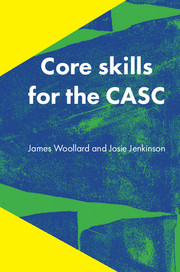7 - Individual preparation
from Part 2 - Planning your preparation
Published online by Cambridge University Press: 01 January 2018
Summary
Start with securing your knowledge base as described in the previous chapter and have a look at the additional resources at the end of this book. Prepare a revision plan at least 4–6 months in advance of the exam date, taking into account any major commitments and on-call patterns. As you will have found out in studying for written exams, it can be very difficult to motivate yourself to do exam preparation after a full day of clinical work. The good thing about the CASC is that there are opportunities during your working day to maximise your preparation through practising your skills and getting colleagues to observe you. Approach as many colleagues as you can, particularly Royal College of Psychiatrists examiners or people who have recently passed the CASC, for their help. If you have not had the opportunity to do a job in one of the subspecialties such as intellectual disability or addictions, consider spending some time with the consultant/registrar working in that specialty or revise with trainees in that subspecialty.
When completing your workplace-based assessment with senior colleagues, push them to give you honest and constructive feedback on how to improve your performance, even if they tell you things you find difficult to hear. At this stage being told you are at a level expected of your grade should not be enough.
Record yourself with a video camera practising stations and watch them back. Look at the ‘bad’ vocal and motor habits you have such as tapping your foot or saying ‘So …’ a lot. Try to work on stopping these. Notice what you particularly like about how you communicate and build on this. Reviewing recorded stations also helps with your revision of structured stations (such as cognitive assessments) to help you see where you could have phrased something better or whether you missed anything out.
As we have previously mentioned, avoid learning a script for a station. This is a short-sighted way of approaching the CASC and will inevitably trip you up in the exam when the station evolves slightly differently. Try to develop confidence and competence in dealing with whatever is thrown at you – it is what you do in real life.
- Type
- Chapter
- Information
- Core Skills for the CASC , pp. 39 - 42Publisher: Royal College of PsychiatristsPrint publication year: 2016

